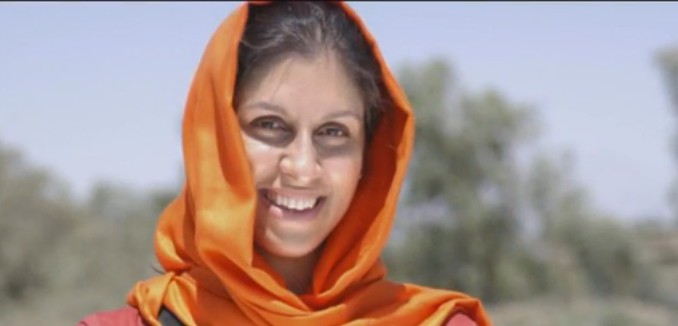A British-Iranian woman arrested by Iranian authorities in April will be charged with attempting to cause the “soft toppling” of the regime, the Associated Press reported Wednesday, citing Iranian media.
Nazanin Zaghari-Ratcliffe, an employee of the Thomson Reuters Foundation who was visiting family in Iran, was detained by the Islamic Revolutionary Guard Corps as she prepared to leave the country with her toddler daughter. The IRGC confiscated her passport at the airport and her daughter was taken to live with relatives.
Richard Ratcliffe described his wife as “not political … but someone with a sincere moral core and great integrity. It is to Iran’s shame that people like her are subjected to this treatment.” He called the charges against his wife “farcical,” adding that “the idea that there is some malevolent network headed by Nazanin and her 2-year-old daughter is nonsense.”
The IRGC charged Zaghari-Ratcliffe with the “design and implementation of cyber and media projects to cause the soft toppling of the Islamic Republic,” according to the state-run IRNA news agency.
Thomson-Reuters denied that it had any dealings in Iran, and said it had no plans to operate there. Its foundation is dedicated to training journalists and advocating for human rights issues. “Nazanin has been working at the Thomson Reuters Foundation for the past four years as a project coordinator in charge of grants applications and training, and had no dealing with Iran in her professional capacity,” said Monique Villa, the foundation’s CEO.
Britain’s Foreign Office said that it was seeking information on Zaghari-Ratcliffe and the accusations against her. Foreign Secretary Philip Hammond is reported to have contacted his Iranian counterpart over the case. Since Iran does not recognize dual citizenship, Zaghari-Ratcliffe has not been granted access to British consular officials.
Zaghari-Ratcliffe’s detention comes amid reports that Iran is increasingly cracking down on dual nationals visiting the country. Canadian-Iranian scholar Homa Hoodfar was arrested earlier this year when she returned to Iran to see her family. A number of other dual citizens are being held by Iran, including businessman Siamak Namazi and his father, Baquer Namazi, both of whom have American and Iranian citizenship. Another British-Iranian, businessman Kamal Foroughi, has also been arrested, as has Nizar Zakka, a Lebanese national with U.S. permanent residency.
“Analysts say that some of those prisoners have value for the Iranian authorities as possible bargaining chips in future swaps,” The New York Times noted while reporting on Homa Hoodfar’s arrest.
Iran released five imprisoned American-Iranians, including Washington Post reporter Jason Rezaian, in January just as the United States transferred $1.7 billion to the country, raising concerns that the payment was a ransom. The $1.7 billion, which came from a U.S. taxpayer-supported fund, was appropriated to supplement Iran’s expanding military budget.
An editorial in The Washington Post last year warned that the arrest and trial of its reporter, Rezaian, showed that “well-meaning foreign visitors … are vulnerable to being seized as hostage.” A Post editorial after the nuclear deal was announced asked rhetorically, “will Western business owners visiting Tehran be safe from the fate of Mr. Rezaian — a correspondent duly credentialed by the Ministry of Culture and Islamic Guidance who was abducted by security forces and held in solitary confinement for months without charge while being subjected to harsh interrogation?”
In Why Does Iran Keep Taking American Hostages?, published in the September 2015 issue of The Tower Magazine, Iran expert Ali Alfoneh described the regime’s hostage-taking as “a perfectly normal procedure and political practice in the Islamic Republic. That has been the case since the first day of the revolution and continues until today.”
[Photo: Madad Shah / YouTube ]




